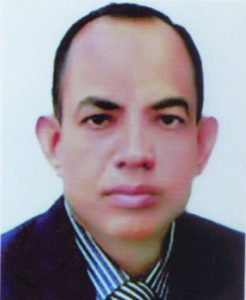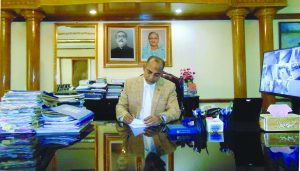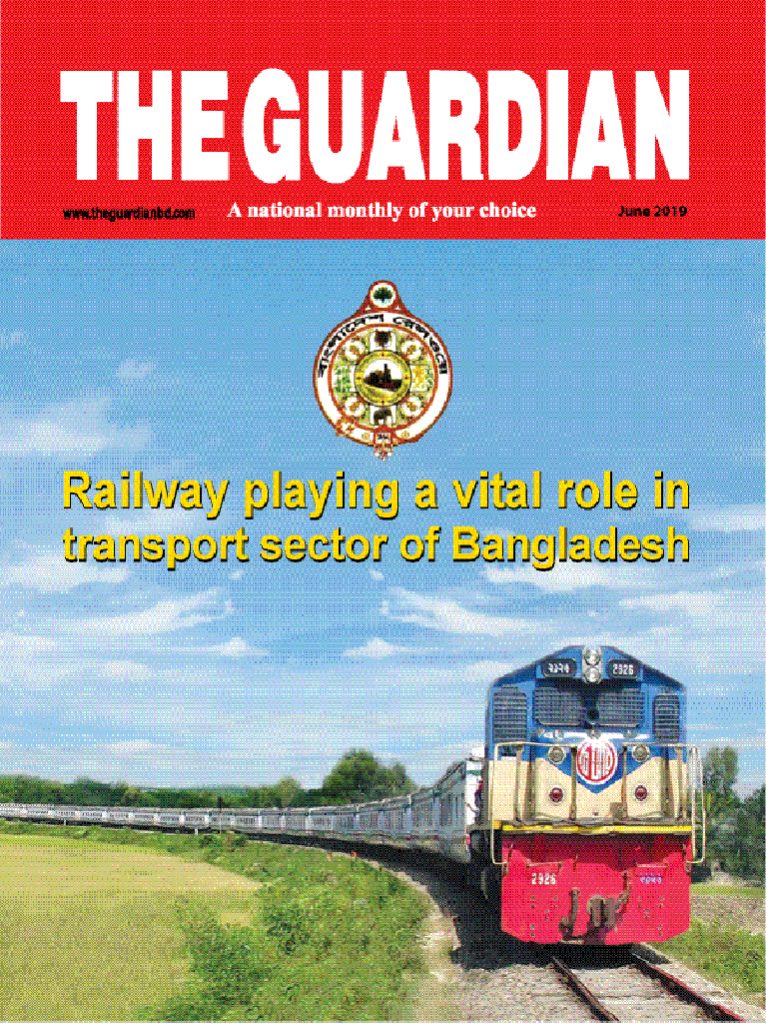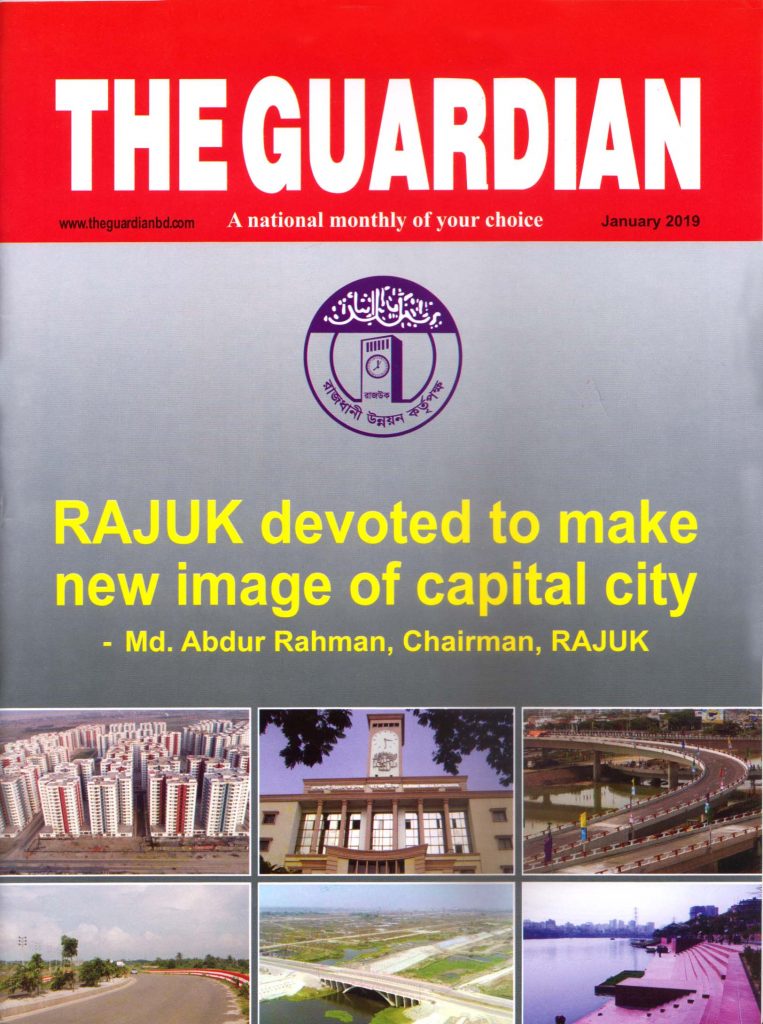The capital city of Dhaka is the centre of all activities of the country, so it must be functional so that everyday life runs expectedly, said Md. Abdur Rahman, an Additional Secretary to the government and Chairman of RAJUK, in an exclusive interview with The Guardian. Alongside this, the Chairman realized that the aesthetic quality of the capital city is another important factor to build the image of the country.
In this context, the Chairman informed us that keeping all these in view, RAJUK is currently implementing a good number of development projects and devoted to make a new image of capital city. Among these projects, new township/-housing projects, lake development projects, multistoried car parking-cum-office building construction, road and flyover construction across the capital, including development control through plan permit are prominently mentionable.
As a matter of fact, a highly experienced bureaucrat of the country, Mr. Rahman said that it is very important to control the growth of Dhaka right now; otherwise it will go beyond the manageable limit. In this context, he mentioned that whatever it was in the past, but currently RAJUK has planned the city to control growth in a planned way and according to the requirement of the plan, facilities are being tried to provide.
The Chairman also warned that if growth is unplanned and haphazard, no authority will be able to ensure facilities for the dwellers of the capital city. He hopes that the proper implementation of DAP will be important to prevent haphazard development. In this context, he also urged everybody to follow the Master Plan of Dhaka city as well as to abide by the laws of the land to make the capital city smoothly livable and functional.
When asked to identify the current problems of the capital city, he said that Dhaka city is beset with a number of problems. Among all those, he identified housing backlog, congested roads, inadequate utilities and inadequate social facilities.
When asked to disclose the reasons behind, he said that absence of proper city planning, its proper implementation and lack of proper development control are primarily responsible for this situation. When requested to say how to make the way out of the problems, the learned Chairman suggested for good planning practice and proper development control, insisting collective effort a must for this.
In reply to another question, the Chairman mentioned that at present RAJUK has the organogram of 1940 manpower working at various levels, but the existing manpower is not sufficient enough for the development and development control and to implement the latest Master Plan of the whole RAJUK area. He also informed that RAJUK has proposed a new organogram, which is now under active consideration of the government.
In an exclusive interview, the Chairman replied to several questions covering the history, activities of RAJUK, its limitations, problems, potentials, contributions, achievements and future plans, including the different aspects of challenges and development of capital city. His deliberations are quite outstanding, informative, educative and interesting as well. The valuable excerpts of his interview are produced here for The Guardian readers at home and abroad:
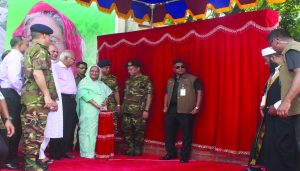
Prime Minister Sheikh Hasina inaugurates a structure of RAJUK at Hatirjheel. Minister for Housing & Public Works Engr. Mosharraf Hossain, MP and Chairman of RAJUK Md. Abdur Rahman are seen present among others.
The Guardian: Please give us some trace of history and development of Dhaka city?
Chairman: Dhaka city has the history of over 400 years as the capital city. But its history starts back from the 10th century. It served as the Mughal capital of Bengal from 1608 to 1704. Before coming under British rule in 1765 it was a trading centre for British, French and Dutch colonialism. In 1905 it was again turned as the capital of Bengal, and in 1956 it became the capital of East Pakistan. After independence in1971 the city again regained the status of capital city of an independent country. In 1982 the spelling was changed from ‘Dacca’ to ‘Dhaka’.
The Guardian: In this context, would you give us a short introduction to the founding history of Rajdhani Unnayan Kartripakkha (RAJUK)?
Chairman: Rajdhani Unnnayan Kartripakkha (RAJUK) is the supreme organization for planning, development and development control of Dhaka city. It was established under the Town Improvement Act, 1953 in 1956 with the name of Dhaka Improvement Trust (DIT). It was reformed in April 30, 1987 under the amendment of TI Act, 1953 (amendment 1987) and named as Rajdhani Unnnayan Kartripakkha (RAJUK).
The Guardian: Would you discuss the aims and objectives of RAJUK and say how far it has been able to achieve its aims and objectives?
Chairman: RAJUK was emerged through the ongoing crisis of planned and controlled development of Dhaka city. The major aims and objectives of RAJUK are to prepare Plan, Development and Development Control of the capital city.
The Guardian: Keeping this in view, would you say what activities RAJUK is currently implementing?
Chairman: As an apex body of planning and development, RAJUK prepares Master Plan for its jurisdiction area. Under the following aims and objectives, RAJUK is undertaking some development activities like housing projects, lake development projects, multistoried car parking-cum-office building construction, road and flyover construction etc. Other activities include development control through plan permit.
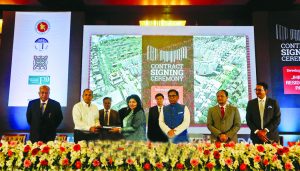
Contract signing ceremony between RAJUK and BNG Global Holdings SDNBHD & Consortium for development of Jhilmil Residential Park. Chairman of RAJUK Md. Abdur Rahman and CEO of BNG Global Holdings Dr. Sabrina are exchanging documents after signing the contract. Minister for Housing & Public Works Engr. Mosharraf Hossain, MP and State Minister for Power, Energy & Mineral Resources Nasrul Hamid, MP are seen present among others.
Now RAJUK is preparing the Detailed Area Plan (DAP) for the period of 2016-2035 and I hope that the new DAP will give a guideline for developing the capital city.
The Guardian: As a highly experienced bureaucrat of the country, would you say what should be the definition of a capital city considering the present socio-economic condition of an over populated country like ours and say what further steps RAJUK authorities should take in ensuring the required facilities for the dwellers of the capital city of Dhaka?
Chairman: Capital city is the centre of socio-economic activities of the country. So, it must be functional so that everyday life runs smoothly. Aesthetic quality is another important thing as the capital city helps to build image of the country. But it is very important to control the growth of Dhaka right now. Otherwise it will go beyond the manageable limit.
RAJUK has planned the city to control growth in a planned way. And according to the requirement of the plan, facilities are being tried to provide. But it must be remembered that if growth is unplanned and haphazard no authority will be able to ensure facilities for the dwellers of the city.
The Guardian: In this context, would you mention the numbers of Master Plan RAJUK took since its inception till date? In this context, would you tell us some salient features of the latest Master Plan and say what steps are being taken to effectively implement this Master Plan so that the Dhaka city can turn into a complete capital city in true sense of the term?
Chairman: RAJUK having the authority to prepare Master Plan for the capital city under Town Improvement Act, 1953, it took a number of initiatives for plan preparation. The first Master Plan of Dhaka was prepared in 1959 covering roughly 830 sq. km (320 sq. miles). Although, the Plan was prepared for a period of 20 years (1959-79) time but it lasted almost double till the enforcement of new plan in 1995 that is Dhaka Metropolitan Development Plan (DMDP), 1995-2015.
It was a three tier plan package with the last tier named as Detailed Area Plan (DAP). The plan package suggests land use zones as residential, commercial, industrial, institutional use, mixed use, etc. and designated Flood Flow Zone, Water Retention Area and Water Body in the jurisdiction area. The plan also prepared a road and communication network plan.
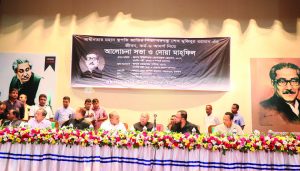
Minister for Health & Family Welfare Mohammad Nasim, MP attends as chief guest in the discussion meeting and doa mahfil organized by RAJUK on the occasion of National Mourning Day on 15 August 2018. The Chairman and Members of RAJUK are seen present amog others.
The Guardian: You know the capital city of Dhaka is facing heavy pressure to bear the present load of over population. Side by side this, the number of population is tremendously increasing here day by day and people from all around the country are rushing towards the capital city. As a result, the concerned experts think that the capital city will, no doubt, be disorder and unfit for human habitation very soon. In such a situation, would you say what immediate step should be taken to predetermine the boundary of the capital city and what realistic plan should be taken to keep the capital city functional in future as well as to keep it fit for human habitation in real sense ?
Chairman: RAJUK’s jurisdiction area was fixed to 590 sq. mile (1528 sq. km.) in 1987 including part of Gazipur and Narayanganj Zila. Later, in 1995 Dhaka Structure Plan was prepared for the whole city region to develop major policy framework for the city. The Plan suggests that the whole 590 sq. mile is not suitable for development. Under this, Detailed Area Plan was prepared and gazetted in June 2010.
The new revised DAP for the period of 2016-2035 is going on and may be completed within March 2019, that will give the proper guideline for preventing the haphazard development.
The Guardian: In this context, would you tell us the present institutional capacity, including the strength of manpower, budget and other facilities of RAJUK?
Chairman: At present RAJUK has the organogram of 1940 manpower working at various levels. But the existing manpower is not sufficient for the development and development control and to implement the latest master plan of the whole RAJUK area.
The Guardian: Though RAJUK is the principal organization in the development of the capital city, but there are other organizations like DCC, Dhaka WASA, DPHE, National Housing Authority, Roads & Highways Department which are also directly or indirectly involved with various types of development works of the capital city. It is said that in crisis of proper coordination among the activities of all these organizations, RAJUK has to face more and more problems in implementing its development activities. Would you give your reaction to this and suggest what step should be taken to solve these types of problem?
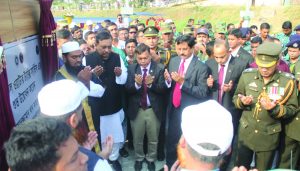
Minister for Home Affairs Asaduzzaman Khan Kamal, MP as chief guest inaugurates the water taxi service at Hatirjheel. Secretary of Ministry of Housing & Public Works Md. Shahid Ullah Khandaker, Chairman of RAJUK Md. Abdur Rahman and PD of Hatirjheel Major General Abu Sayed Md. Masud are seen present among others.
Chairman: Several organizations are involved in the development activities of the capital city and lack of coordination is a major problem for smooth running. But all the organizations should follow DAP and take development programme under this plan.
The Guardian: In this context, would you mention what guidelines are available in the latest Master Plan in solving these types of problem and say what legal supports are also available in the Master Plan to meet the encounters with different other organizations working under the areas of RAJUK?
Chairman: The Detailed Area Plan gives emphasis on implementation of the plan with total coordination of all agencies. The projects suggested in DAP will be implemented by different agencies for the betterment of the city.
The Guardian: You know RAJUK has been established as an autonomous body upon the Town Improvement (Amendment) Ordinance 1987, where it has been given autonomy to work independently, but it is alleged that the authorities of RAJUK are always interrupted in allotting plots by the unscrupulous persons, especially by the party in power to fulfil their undue group interests. In such a situation, would you say why RAJUK authorities are not contemplating to play due role in executing its autonomous powers to run it as an ideal organization to serve all the citizens equally?
Chairman: RAJUK as an autonomous body performs its function according to its rules and regulations. This is also applicable to the plot allotment procedure. In the last plot allotment procedure of Purbachal, RAJUK with the help of BUET conducted a fair lottery in different categories.
The Guardian: As a matter of fact, would you explain the existing system of plot allotments and also give your reaction to the allegation that the RAJUK plots are allotted in a way that only the pre-chosen as well as the rich section of people get priority, whereas who need it the most, the middle class as well as the lower middle class are always deprived of the opportunity? In this context, would you say whether RAJUK has any scheme or plan for lower income group of people?
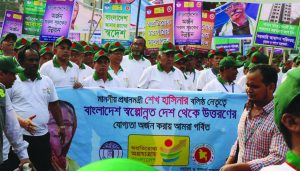
The Chairman of RAJUK is seen in the rally with Minister for Housing & Public Works Engr. Mosharraf Hossain, MP and Secretary of Ministry Md. Shahid Ullah Khandaker and others organized by RAJUK on the occasion of Bangladesh’s promotion from LDC towards DC.
Chairman: The existing plot allotment system follows government regulations for different category. It is for all income groups. But for the low income group some portion is designated for therein the current RAJUK projects like Uttara 3rd phase, Purbachal New Town and Jhilmeel Residential Area. RAJUK is going to build about 80,000 flats for low and middle income group in those projects.
The Guardian: It is learnt that according to the Building Construction Act-1952 without the approval of plan by RAJUK, no construction can be made and RAJUK is the sole authority to stop as well as to remove the illegal constructions and establishments. Despite the fact, it is observed that one’s land is being grabbed by the other, even hundreds of acres of public lands have already been grabbed by illegal occupants, say by the politicians, touts, musclemen and private business companies, etc. For instance, though Rangs Bhaban was demolished, the BGMEA Bhaban or many others like this still remain untouched. In such a situation, RAJUK authorities seem to be quite silent and have also failed to play its due role in this regard. Would you give your reaction to this and say what immediate action it can take to implement the spirit of law that ‘law is equal to all’?
Chairman: RAJUK is giving its earnest effort to save the public land from land grabbers. Due to some stay order from court, RAJUK has to wait until the final court verdict. RAJUK takes immediate action against them after court’s positisve decision.
The Guardian: It is heard that regarding possession and dispossession of Gulshan-Banani Lake, RAJUK is facing a number of cases from the land grabbers. Would you discuss the reasons why RAJUK is facing cases in protecting public land despite its having specific laws to tackle the land pirates?
Chairman: Some land grabbers claim that they have land in the lake areas and files cases but RAJUK will not consider them. RAJUK also files cases against them under Water Body Conservation Act, 2000. RAJUK’s law department is working hard against them to protect public land and water bodies.
The Guardian: Would you also inform us whether RAJUK is facing any more cases from other land grabbers?
Chairman: It is true that RAJUK has to face such cases from time to time but the authority is determined to save the public lands from the land grabbers.
The Guardian: In this context, would you also say what step the government should take alongside the RAJUK to rescue and protect the public lands around the RAJUK areas as well as across the country?
Chairman: Some government initiatives can help to save and protect public lands from grabbers First of all, government should prepare a digital data base with detailed information of land and then government can prepare a land use plan for the public lands for proper utilization of them.
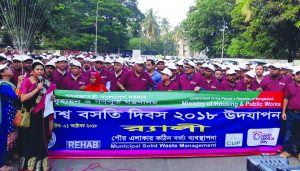
The Chairman of RAJUK is seen in the rally with Minister for Housing & Public Works Engr. Mosharraf Hossain, MP and Secretary of Ministry Md. Shahid Ullah Khandaker and others organized by the Ministry of Housing & Public Works on the occasion of World Habitat Day 2018.
The Guardian: It is alleged that there exists a huge corruption among the rank and file of some particular sections of RAJUK and in close collaboration with those corrupt RAJUK officials, the vicious circles take opportunity to grab lands, pass illegal plans, construct buildings illegally and achieve plots unduly. Would you give your reaction to this and suggest what punitive action can be taken to stop these types of evil practice among the concerned RAJUK officials as well as among the vicious circles?
Chairman: In order to protect corruption a number of steps have already been taken. Any complaint of corruption is scrutinized and penalty is given for the proven cases. Besides that, digital archiving is under process which will also help to protect corruption. At the same time people are asked to complain directly for any such instances.
The Guardian: In this context, would you disclose the existing system of passing plan and say how this system can be made more effective and free from corruption?
Chairman: In the existing system two clearances are required before construction; they are Land Use Clearance and approval building plan. Town Planning and Plan Approval Section are involved in this. Digital archiving of all the documents is on process which will be effective to solve such problems.
The Guardian: It is alleged that due to passing of illegal plan, sometimes innocent individual’s plot or land is grabbed by unscrupulous persons by illegal construction. In most of the cases when the innocent individuals become unable to give a big sum of bribe to the concerned officials of RAJUK to get help to save their plots or lands, they do not respond to them, even such cases are available in different zones of RAJUK, including Uttar of Dhaka also. As a result, these helpless, honest people are losing their own legal lands. It is said that a lot of such complaints still remain pending with RAJUK, which are yet to be resolved. Would you give your reaction to this and say what immediate measures can be taken to help the losers as well as to punish the culprits?
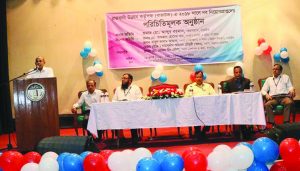
The Chairman is addressing as chief guest in the function organized for newly appointed employees of RAJUK. Members of RAJUK are seen present on the podium.
Chairman: RAJUK is trying hard to solve the problem with its limited manpower. All the complaints are handled carefully and sequentially. But due to the manpower constraints it takes some time.
The Guardian: Now in Bangladesh, especially under the areas of the RAJUK a large number of housing companies have grown up and many more companies are coming as a fungus growth in the name of development. Would you mention the number of these companies? In this context, would you say on what conditions they are given approval for operation and how they are punished when they violate the rules of RAJUK?
Chairman: Total 650 real estate housing companies are registered in RAJUK. They have to fulfill certain conditions such as Absolute ownership of land, collection of no objection certificates from different public agencies, compliance with detailed area plan and layout preparation as per private residential land development rules 2004 to go for operation. After that the projects must be approved by RAJUK under Private Housing Project Land Development Rules, 2004. If they violate rules their registration may be cancelled.
The Guardian: It is alleged that many housing companies are misappropriating the individual’s money in the name of giving plot and housing apartment. Since RAJUK is the sole authority in this regard, would you say what role RAJUK is playing in guiding as well as in monitoring the activities of the housing companies and real estate businesses under the jurisdiction of RAJUK to ensure the legal rights of clients as well as the people of the country?
Chairman: Housing projects must be approved by RAJUK within its jurisdiction area. It is completely illegal to sell or advertise for sale of plots and flats prior to approval. Time to time RAJUK gives notices in newspapers against these activities. RAJUK even sues against the rules violating housing companies. I also wish that people will be more careful before purchasing plot/flats about their approval.
The Guardian: It is learnt that apart from regulatory measures and plot allotment activities, RAJUK at present performs different types of development works including apartment building and selling to give comfort to the life of the dwellers in capital city as well as to bring dynamism into the socio-economic life under the areas of the capital city. Would you mention the names of all those works of RAJUK?
Chairman: RAJUK is undertaking some development activities like New Township/Housing Projects in Uttara 3rd Phase, Purbachal New Town and Jhilmil Residential Area, Lake Improvement/Beautification Project in Hatirjheel and Banani, Gulshan and Mohakhali Lake, Multistoried Car Parking-cum-office Building at Gulshan-1, Road and Flyover Construction, etc.
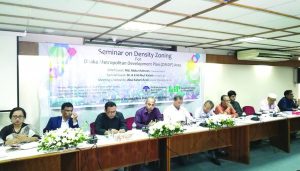
The Chairman attends as chief guest in the seminar on density zoning for DMDP area organized by RAJUK. Member Planning and concerned officials of RAJUK are seen present among others.
The Guardian: Would you mention the number of present population of the capital city of Dhaka and also reflect the significance of the construction of high-rise building to solve the severe residential problems of the capital city?
Chairman: The present population of Dhaka city is about 18 million which is forecasted as 25 million by the end of 2035. Again, Dhaka’s horizontal growth is limited by its topographical conditions- the flood plains, agricultural lands, etc. So, only vertical expansion through high-rise construction in the designated suitable places can solve the housing problem of this huge population.
The Guardian: Would you also discuss the different other problems concerned with the development of the capital city of Dhaka and suggest their possible remedial measures?
Chairman: Dhaka City is beset with a number of problems. Housing backlog, congested roads, inadequate utilities and social facilities – all have turned Dhaka almost to a non-functional city. Absence of proper city planning, its implementation and lack of proper development control are responsible for this situation. So, time has come to overcome the problems through good planning practice and proper development control. Collective effort is a must for this.
The Guardian: It is also learnt that under your untiring efforts some new development projects are progressing fast to be completed soon. Would you please tell us something in brief about all those projects?
Chairman: Our new development projects are fast progressing. We have already completed 79 high-rise buildings of 6636 flats at Uttara 18 no. sector, which have been opened by our Hon’able Prime Minister Sheikh Hasina on 3rd November 2018.
We have also started the work for 85 buildings of 13920 flats at Jhilmil Residential Project, under the PPP Concern. There are Madani-Shitolakka Road Project, Kuril-Balu River 100-Khal Project already passed by the ECNEC and Kuril-Balu river 100-Khal will be completed within March 2019. Our another important project Fakirapool-Jhilmil Flyover is under approval by the competent authority.
Expect these projects, we have other two land project, which are under approval. These are- Keranigonj housing project and Turag river development and township project. Besides these projects, RAJUK has taken carparking project at Motijheel. RAJUK is also surveying the exclusively commercial town project and educational city project within the RAJUK jurisdiction.
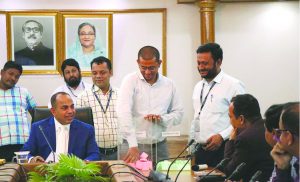
The Chairman is presiding over the function of Lottery for Apartment organized by RAJUK. Member (Development) of RAJUK is seen present among concerned RAJUK officials and participants in lottery.
The Guardian: In the end, please give your valuable message for the people living in the capital city of Dhaka?
Chairman: I earnestly want to say that everyone should follow the plan of Dhaka city as well as abide by the rules and regulations of the RAJUK to make our city livable and functional.
Brief Profile of Mr. Rahman
Chairman of RAJUK Md. Abdur Rahman is a civil servant of virtues. He obtained a number of higher degrees in different disciplines from the various renowned institutions of the country. He obtained the degree of B.Sc. in Civil Engineering in 1983 from Rajshahi Engineering College, now Rajshahi University of Engineering &Technology. He received Bachelor of Law from the University of Rajshahi in 1989 and the degree of MS in Environmental Science from the State University, Dhaka.
After completion his graduation in engineering, Engr. Abdur Rahman started his career as an engineer in 1986 through joining the Roads & Highways Department as Assistant Engineer. He was promoted to the post of Executive Engineer in RHD in 2005 and served RHD up to November 2006. In December 2006, he joined the Administration Cadre and was promoted as Deputy Secretary to the Government of Bangladesh. He became Joint Secretary in 2010 and Additional Secretary in April 2015.
During his long uninterrupted service career, he held various important positions of the government and performed many significant assignments with high reputation. While his service with RHD, he worked at RHD Headquarters, Dhaka and its different offices and regions, including Barisal, Naogaon, Rajshahi, Mymensing and Narayanganj.
As civil servant, Mr. Rahaman worked as Director of National Sports Council from 2007 to 2013 and played a very important role in preparing the venue for SA Games, Cricket World Cup and Cricket T-20 World Cup. He worked as Joint Secretary in the Ministry of Youth & Sports. He worked as Member (Engineering) at BEPZA and prior to his joining as Chairman of RAJUK, he was Member (Development) and also Member (Planning) at RAJUK.
Mr. Rahman is a committed civil servant. He is amiable to all and a well-mannered gentleman as well.

